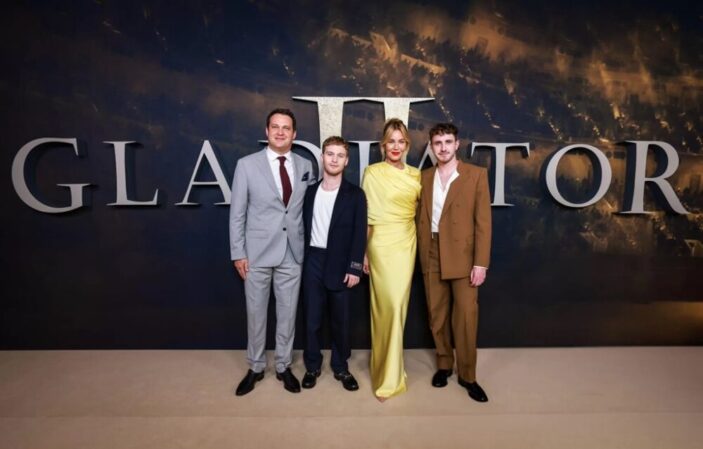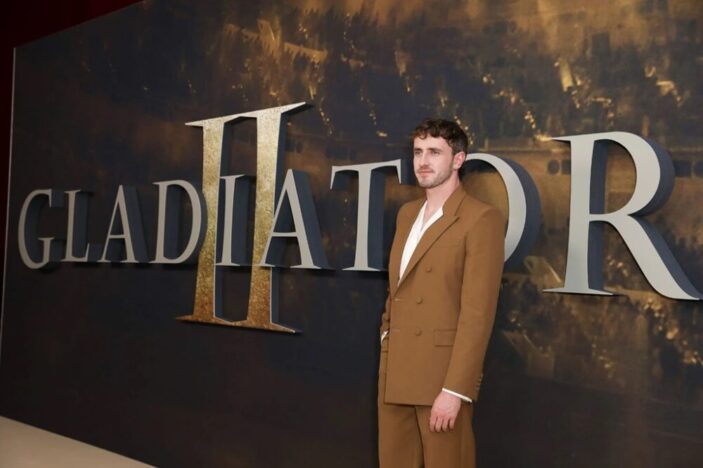
Ushering in a new generation of heroes, legendary director Ridley Scott continues the epic Gladiator saga of power, intrigue, and vengeance set in Ancient Rome with Gladiator II.
Years after witnessing the death of the revered hero Maximus at the hands of his uncle, Lucius (Paul Mescal) is forced to enter the Colosseum after his home is conquered by the tyrannical Emperors who now lead Rome with an iron fist. With rage in his heart and the future of the Empire at stake, Lucius must look to his past to find strength and honor to return the glory of Rome to its people.
As the film battles up to take on cinema screens across the globe, Paul, producer Michael Pruss, and stars Connie Nielsen and Fred Hechinger kicked off their world promotional tour in Sydney, Australia, where the film premiered at the landmark Darling Harbour at the state-of-the-art ICC Sydney Theatre.
Talking to the creatives on the red carpet, Peter Gray touched on continuing the essence of the original film, what aspects proved most challenging, and the unlikely inspiration that came for certain characters.
The original film left such a cultural mark. How do you, as a producer, balance the essence of the original film, whilst keeping it fresh for a new audience?
Michael Pruss: There’s so many answers to that question, but most importantly is Sir Ridley Scott, who I have worked with for over a decade. He’s one of the greatest filmmakers of our time, and he had a vision for this film. He knew exactly what he wanted. And as a producer, I’m supporting an artistic vision. I have to know when to push and I have to know when to get out of the way. Working with Ridley as I have on films like Napoleon, we wanted to support that vision. And that vision requires thousands of people and hundreds of millions of dollars. It takes a lot of time (too). But, most importantly, it has to tell a story that’s worth telling. I think that’s why it took so long. It took 5 years to really crack that script. It’s about finding that hero’s journey with Paul (Mescal) and Lucius as a character, and finding an antagonist that managed to live up to what Joaquin (Phoenix) did, and thankfully we found that in Denzel Washington. It’s a huge operation. It takes a village. And I’m here tonight because so many people did an amazing job.
We were always conscious of making a film that served as an homage to the first, but also stood on its own two feet. A lot of people haven’t seen the first film. You know, 25 years? You can’t just lean into that. You’ve got to make something that works as its own axiomatic film.
One of the great lines of the film is “What we do here, echoes in eternity.” Because film is immortal. Looking at your career as a producer, is there one film you’ve worked on that you’d look at being hopefully immortal.
Michael Pruss: Oh my God. Honestly, this is it. I said to my wife yesterday that I could retire after this. It’s never going to get any better for me. I can find an island home and just retire. You won’t see me on a red carpet after this (laughs).
Connie, regarding the reprisal of your role. What did you find the most challenging aspect? Whether it was emotional or physical?
Connie Nielsen: I wasn’t looking at it as challenging. I was really just wanting to do justice to her and to all of those situations. I always love doing the actual preparation for the work. I worked by studying, in particular, Tom Holland’s “Rubicon”, an incredible book that really details the end of the republic, and I found myself just thinking, “Wow, the things that were threatening the public then are the same things that are threatening us now.” It’s these hypocrisies, like who will we allow to participate in power? And who will we not? And at what cost? It was just so interesting to sit with that and feel those feelings, because I invested those in Lucilla.

With Lucius in this film, he’s battling his mortality here. Did tackling such themes add any new perspective for yourself about finding your own purpose?
Paul Mescal: You know, I’m petrified of the idea of death. I’m not one of those people that sits comfortably with that. I’m jealous of people who think, “When it comes, it comes.” That was a big shift for me. Lucius spends so much of the film not really afraid of death. He doesn’t feel like he has anything to live for. He’s not afraid to die. And I find that psychological landscape hard to wrap my head around.
Fred, yourself and Joseph Quinn are so deliciously unhinged in this. Was there a performance, or character, or personality that you took any inspiration from when creating Caracalla?
Fred Hechinger: We spoke a lot about what could inspire, and some of it was done jokingly, but at the end of the day you have to serve these characters in the way they deserve. Ridley and I did discuss Sid Vicious and Johnny Rotten at some points. I know it’s probably a more anachronistic reference than you might expect, but it was helpful for certain aspects as to who they are.
Gladiator II is exclusively screening in Australian theatres from November 14th, 2024.
